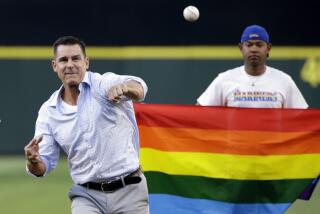Jackie Robinson Knew the Score Back in 1972
Fourteen years after his death, Jackie Robinson is still the center of a baseball storm.
What might he have thought of the furor provoked by Al Campanis’ remarks on “Nightline”?
I asked him. Fifteen years ago.
In January 1972, Robinson, then just shy of 53, was speaking at the National Restaurant Assn.’s convention in Los Angeles. The year marked the 25th anniversary of his debut with the Brooklyn Dodgers that knocked down baseball’s color barrier.
He had no idea, of course, that in ‘87, his old pal Campanis, the other half of the Montreal Royals’ 1946 keystone combination, would virtually negate everything Robinson and the Dodgers stood for with a few careless remarks.
He might have been astounded by baseball’s unaltered mentality. Or perhaps not.
In that 1972 interview, Robinson said: “Baseball is tragically behind the progress in other areas. The owners are still wallowing around in the 19th Century, believing that blacks and whites cannot work together if the black guy is a manager or if the black guy is in the front office.
“I think we’ve got to find another (Branch) Rickey, and I don’t think there are any around today.”
Has anything changed in 15 years?
Robinson continued: “The big problem today is that too frequently you hear from blacks that ‘We’ve gotta do it on our own.’ That’s well and good--if you have the capabilities.
“But the way we’ve got to do it is by joining hands and working together in our relationships in the community and in every aspect of our American way of life.”
Fifteen years ago, Robinson agreed with Campanis’ idea that blacks generally “may not have some of the necessities” for leadership positions, but only because whites had not gone very far out of their way to prepare them, and that blacks had spent more energy complaining than conforming.
Robinson was a realist, and he preached his message to blacks as well as to whites.
“When a guy is wrong, he’s wrong whether he’s black, white, yellow or green, and we ought to say so,” he said.
“I anger a lot of people because I am outspoken, but I’m not in a popularity contest. I think I’ve established an integrity.”
Robinson was already 27 when he reached the major leagues, so he played for only 10 years. But his impact was immeasurable, even if his influence, in retrospect, was sadly limited. After he retired there was talk that he might manage, but he had other goals.
He was an executive in a New York restaurant chain, board chairman of the Freedom National Bank of New York and head of the Jackie Robinson Construction Co. In those businesses, he stressed enlisting white know-how to bring blacks into the mainstream of the economy. “So we can stand on our own feet,” Robinson said.
Already a sick man, he also gave his time and dwindling energies to the YMCA, the NAACP and the National Conference of Christians and Jews. He served on a prison board and in black fund-raising campaigns.
Manage a baseball team?
“I wouldn’t be interested unless it was a deal that I couldn’t turn down,” Robinson said. “I’m too old for it and I’m very happy trying to break into the business process now. We can do the same thing, with the partners I have, that we did in baseball.”
But nine months later, on Oct. 24, he had a heart attack and died.
His legacy?
“I’m very grateful for what sports has done for me, but I’m not subservient to it,” Robinson said that night in early 1972. “I think I gave as much as they gave me. Sports is not keeping up with other areas in our American system.”
More to Read
Go beyond the scoreboard
Get the latest on L.A.'s teams in the daily Sports Report newsletter.
You may occasionally receive promotional content from the Los Angeles Times.










